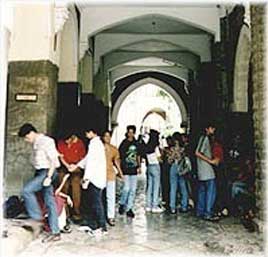
St Xavier's College, one of Mumbai's most prominent academic institutions, has successfully gained autonomy and broken away from the University of Mumbai in order to afford its students a richer education.
Last week St Xavier's College, affiliated to the University of Mumbai, achieved autonomous status. While premiere institutions across the country have done the same, this is a first for the city of Mumbai.
As part of the overhaul of its curriculum and evaluation system, St Xavier's will change to a semester, credit-based method, with less emphasis on year-end exams.
Also, the college's faculty will be able to customise their course design, no longer shackled by the University of Mumbai's rigid syllabi.
St Xavier's principal Fr Frazer Mascarenhas explains the changes to rediff.com's Matthew Schneeberger.
How does the higher education system in India operate? And how does this concept of autonomy figure in?
We have the old British system, where the state universities, like Oxford, have many affiliated colleges under them. But there the number of colleges is limited. In India, because of our large population, this system is no longer possible.
For example, the University of Mumbai controls more than 600 institutions, all of which are very different. There are colleges like St Xavier's, that attract top students and faculty from all across India, and then there are smaller institutions all over Mumbai and even in the outskirts and rural areas, away from the city. The geographical area is very large.
So, these are very disparate types of colleges. But all of them use the same syllabus and same examination system, set by University of Mumbai.
For a three-year undergraduate degree, like the BA or BSc, the degree is given by Mumbai University upon the student satisfactorily completing a final exam at the end of the third year. Because of the large scale, we have to standardise the examinations so that very different types of students and faculties (work) toward the same exams. A lot of opportunity for more individualised instruction and evaluation is lost.
It's not a very nice system, and the university knows it. All of Indian academia knows it. So the government of India and the body that controls higher education, the UGC, have mandated that every university offer their top colleges this thing we call 'autonomy'.
Under autonomous status, the colleges would still be under the university, which would also still give the degree. But colleges would be free to design their own courses, set their own syllabi and have their own evaluating system. It would mean a large amount of freedom.

How did this come about?
It's not a new thing. Colleges in other parts of India have been autonomous for about 30 years. We have in Chennai (run by the same Jesuit management that runs St Xavier's) Loyola and St Joseph's with autonomy. And Bangalore and Kolkata gave it a few years ago to its top colleges.
There is a quality rating body in Bangalore, the National Assessment and Accreditation Council; it assesses the quality of colleges and universities all over the country.
The last time we were accredited, in 2007, the team that came to St Xavier's made recommendations for the college. They strongly recommended to the government of Maharashtra and the University of Mumbai that good colleges like ours should be given maximum academic autonomy, to foster a sense of freedom and to raise the standard of education. And they recommended we pursue a plan for academic autonomy.
Therefore, the UGC recommended that St Xavier's implement international practices -- like the semester system, the credit system, the continuous internal evaluation and the grade point average.
So our next accreditation in 2012 will depend on our ability to implement their suggestions. Our rating would depend on what we have done with their recommendations.
Why did it take so long for St Xavier's to get autonomy?
It's been planned for some time. We have a very a good reputation in Mumbai, and in the rest of country, too. So, for years, many academicians, faculty and well-known alumni have been saying, "Why doesn't Xavier's go autonomous?"
There were several steps that had to be taken.
We first put forward our request in October 2007, to the University of Mumbai. It took a year and a half for them to process the request and to give permission. Then in March 2009 we went to the government of Maharashtra, who gave us permission in September 2009. Then we went to the UGC, who came to the college for a review in April 2010. They just had their meeting (last week), and they have granted us permission through unanimous approval.
Obviously, we didn't expect it to take almost three years, given the reputation of our college. We thought three months, at the most six months. But, ultimately, the delay was a good thing: it gave us time to prepare for changes to the syllabus, credit system, evaluation system, etc.
There is one rider to this, the UGC has given us autonomy from 2010-2011, but the University of Mumbai still has to formally notify us as being autonomous. They told me that they would be doing that in a couple of days. Technically speaking, I cannot declare the college autonomous yet.

So you have an action plan in place?
Yes. We've had plenty of time to prepare for a gradual shift to the new system.
We've had workshops and sessions here on the proposed changes. We sent a team of senior professors to Bangalore and Chennai to study the autonomous colleges there.
We already have quite a good record in innovation in education, thanks to our great faculty team working to improve the education given at St Xavier's.
But these innovations have all been 'add-ons', like our challenging honours programme, while the core syllabus is still stipulated by the University of Mumbai, which is not really challenging to the majority of our students.
In the beginning, teaching will be similar, except our syllabus will change somewhat, about 30 per cent. Because we've already made many drastic changes with the evaluation system, we don't want to change the syllabus too dramatically.
How will the evaluation system change?
We have at the moment a yearly system.
We are adopting a system based on semesters, credits, continuous internal evaluation system and the GPA.
These changes take the pressure off students, who right now really only have to perform well on that one exam. It gives more incentive for real, continuing education -- real learning, we call it -- rather than just rote learning, which the current exam system necessarily promotes.
We also will have mandatory cultural activities credits. They're not academic, so not part of the GPA, but students have to show they've completed the credits.
Secondly, our philosophy is the Jesuit system of education, to develop and train the whole person. Therefore, in our degree, the autonomous system can bring in those elements of education that have not been pressed in the present system: value education, service learning, human rights and cross-disciplinary credits. Education becomes an interdisciplinary quest.
Before, we didn't have any possibility of cross-disciplinary credits. Now it will be possible, in a limited way in the beginning.
Essentially, in the past, we've made a lot of these changes on the periphery of a Xavier's education. Now that we've been granted autonomy, we have the possibility of bringing these changes to the centre.

How will it affect the fee structure?
This is academic autonomy, so it has nothing to do with the financial aspect. Fees will remain the same.
There are private colleges in India, like ours, which still take aid from the government, called grant-in-aid institutions. Basically, it means that all of our salaries are paid by the government. So when that happens, the government stipulates the fee. There are also no-aid private colleges, which are fully autonomous.
But the Jesuit colleges in India have taken the conscious decision to take government aid because we do serve a very poor population, and we hope to offer sound higher education to the large percentage of people without financial resources.
What type of student will the new system at St Xavier's produce?
The critical thinking in academics would improve vastly, while the current exam system would dissolve. This would be a net major gain, to lose the emphasis on rote learning while gaining an appreciation for thinking for yourself and critically examining issues.
We're also looking for our students to become concerned with the problems of India and the problems of the world. Here we have an opportunity to bring them into the mainstream discussion of such important issues.
Our motto at St Xavier's is to produce men and women for others. We would be much more able to focus on that.
What needs to be done on an India-wide level?
Autonomy needs to continue (to be given to) good colleges.
The country is now moving into starting new universities. I think in the last few years, we've started about 50 new, centre-funded universities. And there is a recommendation, which the government is considering, to give straight-away university status to the top 1,500 colleges in the country.
We need a multiplicity of universities. We can't continue with this affiliated colleges system.